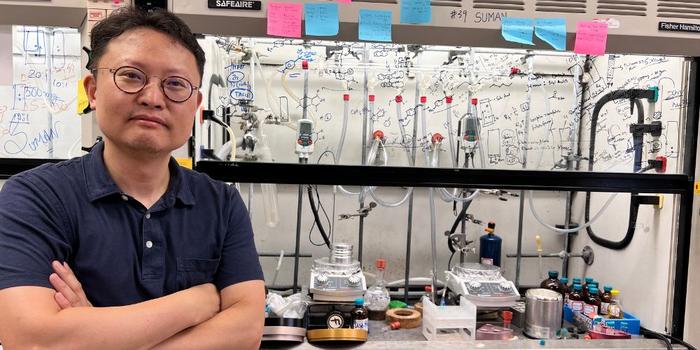With a $300,000 grant, the Welch Foundation is supporting University of Texas at Arlington research into creating new materials to safely and effectively deliver medications to treat diseases such as cancer.

Credit: Courtesy UT Arlington
With a $300,000 grant, the Welch Foundation is supporting University of Texas at Arlington research into creating new materials to safely and effectively deliver medications to treat diseases such as cancer.
Since its founding in 1954, the Houston-based Welch Foundation has contributed over $1.1 billion to the advancement of chemistry through research grants, departmental programs, endowed chairs and other special projects in Texas.
“As one of the nation’s largest private funding sources for chemical research, we are committed to supporting the field in a way that advances science while changing lives,” said Adam Kuspa, president of the foundation. “Medications can only be so effective at treating diseases if we can’t get them to the parts of the body that need them most. I look forward to seeing how Dr. Junha Jeon’s research can help advance and improve drug production so we can improve lives.”
Junha Jeon, associate professor of chemistry and biochemistry at UTA, is leading the project to study “arynes,” a chemical compound formed by removing two hydrogen atoms from benzene. Although scientists have known about arynes for more than 100 years, they only recently discovered that the compounds have a unique ability to deliver antibiotics and anti-tumor medications.
“I’m honored that the Welch Foundation sees the value in supporting our research,” Dr. Jeon said. “Worldwide, an estimated 2 million people are diagnosed with cancer each year, and about one in five people will develop cancer at some time during their lifetime. I’m proud we can research new ways to improve outcomes for people living with cancer and other diseases.”
The transition metal-catalyzed cross-coupling reaction is one of the most widely used and powerful tools in organic synthesis—the art and science of reconstructing substances in the lab. This technique is extensively used to establish crucial chemical bonds and produce biomedical molecules necessary in modern medicine. Currently, most drugs use transition metal catalysts to deliver medications. However, metals often leave impurities that can lead to side effects from otherwise beneficial medications.
Little is known about widely available transition metal-free cross-coupling, especially one that can be used to deliver medicines. The overarching goal of this project is to develop sustainable transition metal-free cross-coupling technologies using arynes. Chemically speaking, arynes are short-lived intermediates holding a functional group with an extremely strained triple bond into a small ring. The strain-driven reactivity of the arynes makes them very useful for the development of cross-coupling reactions.
“Uncovering this new sustainable aryne-forming strategy without using a transition metal catalyst will be valuable for various areas of research, including the production of drugs,” said Jeon. “I’m grateful to the support of the Welch Foundation for our research project.”



